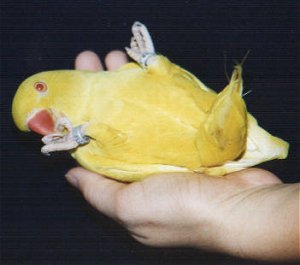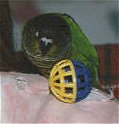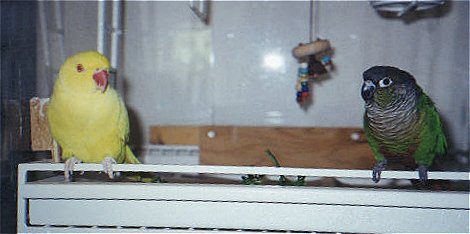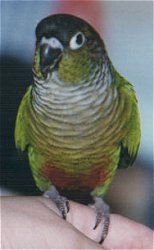

I was sitting in a restaurant with my mom and stepdad when the bite from that morning began
bleeding again. I had gone to kiss my ringneck good morning when she quite ferociously bit
my upper lip. Yellow is my only bird that has a biting problem. Mom handed me a tissue and
I started venting about how angry I was at Yellowís problem.
"Why donít you sell her?" asked my mom.
I stared blankly back at her. Was she joking?
"Are you serious?"
"Yes. Why donít you just sell your ringneck?"
"So do you just sell your kids when theyíve been naughty?"
"I didnít know if you felt that way."
Buying a bird is a huge responsibility. Unfortunately, many people purchase them with
unrealistic expectations. Nothing ever works out exactly like you expect. Often the new owner
does no research and unknowingly teaches the bird many bad habits. When the bird starts biting
or screaming or just doesnít meet the ownerís expectations it is often sold. These birds get
bounced from home to home and are never really worked with to solve the problem. Many end up
unhappily confined in a corner somewhere with no interaction at all.
Birds are very different from all other pets. They can match wits with any dog or feline and
they are not silent decorations like fish and many herps. And unlike dogs and cats, most of the
behavioral problems birds develop are indirectly the fault of the owner. Every little thing you
do, every move you make, every tone you use can affect your birds in a positive or negative
way. Birds naturally scream at dawn and dusk, habitual screaming is a learned behavior.
Plucking can be caused by a number of things as can biting.

 With the exception of three quail when I was downsizing, I have never sold or given away I bird
Iíve bought, not even inactive pairs or bad breeders. I work around the problem, making
adjustments, whatever is needed, but I donít just throw up my hands and unload my problem on
someone else because I made a poor selection. My "children" are not without their problems:
Confetti is skittish, Canuk and Toast donít really like being handled and Yellow bites and
screams when I leave the room for two seconds. They are not perfect, nothing is, but they are
my babies. The thought of selling me ringneck never even occurred to me. Does this not defeat
the purpose of buying a bird?
With the exception of three quail when I was downsizing, I have never sold or given away I bird
Iíve bought, not even inactive pairs or bad breeders. I work around the problem, making
adjustments, whatever is needed, but I donít just throw up my hands and unload my problem on
someone else because I made a poor selection. My "children" are not without their problems:
Confetti is skittish, Canuk and Toast donít really like being handled and Yellow bites and
screams when I leave the room for two seconds. They are not perfect, nothing is, but they are
my babies. The thought of selling me ringneck never even occurred to me. Does this not defeat
the purpose of buying a bird?

 attacked my face. This led to her not completely
trusting my hands. Half the time when they were presented she tried to "defend" herself by
biting. This whole thing became one vicious cycle with her becoming more and more defensive.
After she bit my lip a second time (I know, youíd think Iíd learned not to give her good morning
kisses) I decided something had to be done. My baby was slipping further away from me. Iíd
tried the usual "No!" and evil eye method, which will snap any of my other birds back in line
immediately, to no avail. Her response to this was to puff up and angrily wipe her beak or
bite the air. Clearly she didnít respect my authority. I pulled out my Guide to a Well-Behaved
Parrot and re-read on aggression. This was stuff I already knew but maybe needed to be reminded
of. Alas, it looked like my only hope was the good old "up" command. Normally I only use it
when first taming wild birds so they know what is expected when they are presented with a finger
as opposed to a perch. Once the bird realizes that fingers are "friends" I discard using it.
Since Yellow was now fearful of my fingers though I decided to try it. Iíve been working with
her a few weeks now. Sheís nowhere near perfect, sometimes squeezing my fingers a bit too hard
or biting them outright, but she has gotten much better. I donít expect my birds to be perfect
angels.
attacked my face. This led to her not completely
trusting my hands. Half the time when they were presented she tried to "defend" herself by
biting. This whole thing became one vicious cycle with her becoming more and more defensive.
After she bit my lip a second time (I know, youíd think Iíd learned not to give her good morning
kisses) I decided something had to be done. My baby was slipping further away from me. Iíd
tried the usual "No!" and evil eye method, which will snap any of my other birds back in line
immediately, to no avail. Her response to this was to puff up and angrily wipe her beak or
bite the air. Clearly she didnít respect my authority. I pulled out my Guide to a Well-Behaved
Parrot and re-read on aggression. This was stuff I already knew but maybe needed to be reminded
of. Alas, it looked like my only hope was the good old "up" command. Normally I only use it
when first taming wild birds so they know what is expected when they are presented with a finger
as opposed to a perch. Once the bird realizes that fingers are "friends" I discard using it.
Since Yellow was now fearful of my fingers though I decided to try it. Iíve been working with
her a few weeks now. Sheís nowhere near perfect, sometimes squeezing my fingers a bit too hard
or biting them outright, but she has gotten much better. I donít expect my birds to be perfect
angels.Problems can be solved as long as you are willing to work on them. If you arenít willing to commit, donít bother buying a bird in the first place, or having kids for that matter.

All articles and images contained on this site are © 1998, 1999 by Feisty Feathers unless otherwise noted and may not be reprinted or used in any way without the author's permission.